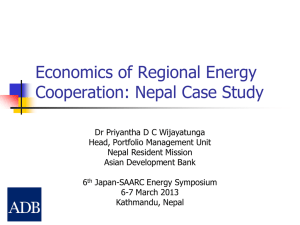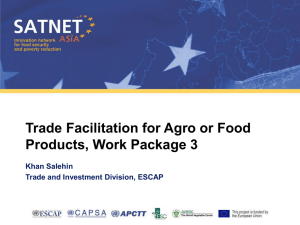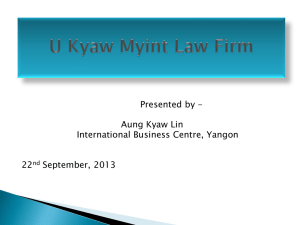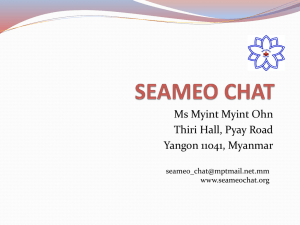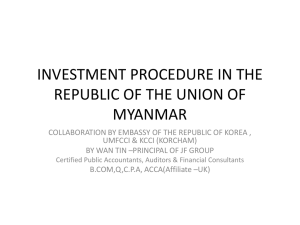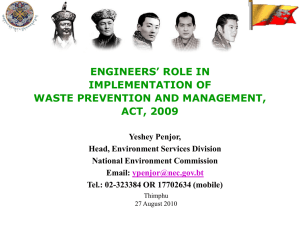speech of the foreign secretary delivered at manipur conference
advertisement
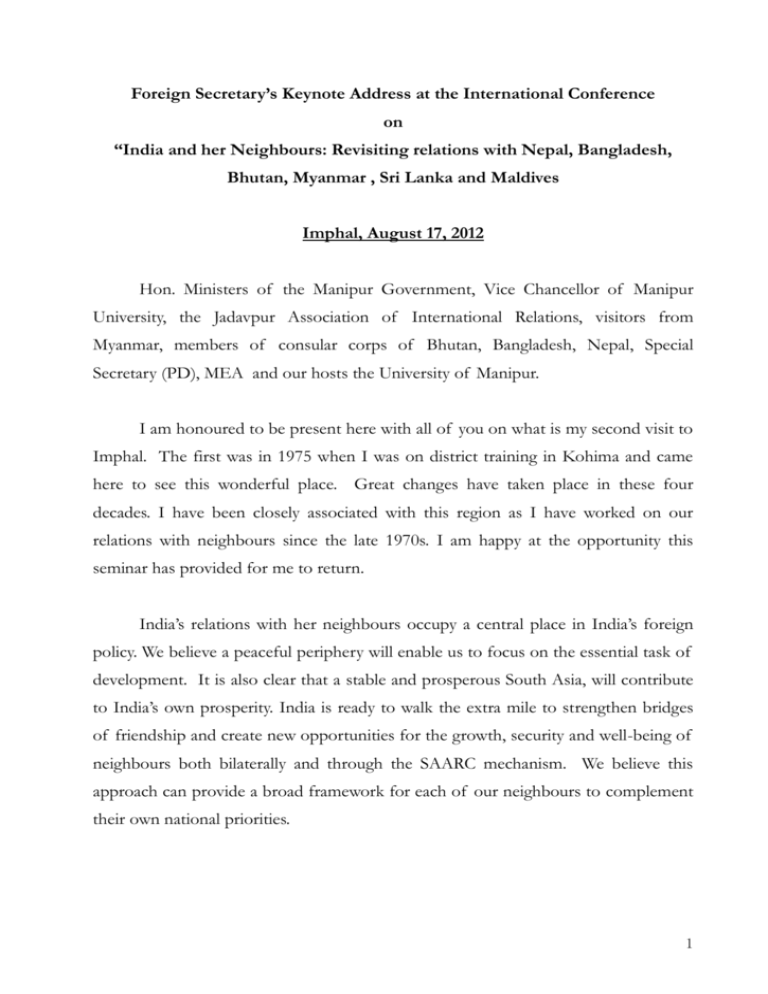
Foreign Secretary’s Keynote Address at the International Conference on “India and her Neighbours: Revisiting relations with Nepal, Bangladesh, Bhutan, Myanmar , Sri Lanka and Maldives Imphal, August 17, 2012 Hon. Ministers of the Manipur Government, Vice Chancellor of Manipur University, the Jadavpur Association of International Relations, visitors from Myanmar, members of consular corps of Bhutan, Bangladesh, Nepal, Special Secretary (PD), MEA and our hosts the University of Manipur. I am honoured to be present here with all of you on what is my second visit to Imphal. The first was in 1975 when I was on district training in Kohima and came here to see this wonderful place. Great changes have taken place in these four decades. I have been closely associated with this region as I have worked on our relations with neighbours since the late 1970s. I am happy at the opportunity this seminar has provided for me to return. India’s relations with her neighbours occupy a central place in India’s foreign policy. We believe a peaceful periphery will enable us to focus on the essential task of development. It is also clear that a stable and prosperous South Asia, will contribute to India’s own prosperity. India is ready to walk the extra mile to strengthen bridges of friendship and create new opportunities for the growth, security and well-being of neighbours both bilaterally and through the SAARC mechanism. We believe this approach can provide a broad framework for each of our neighbours to complement their own national priorities. 1 SAARC has not achieved as much as we hoped. But we remain committed to fostering inter-connectivity and mutual confidence in multiple areas, in promoting trade and investment, and in trying to leverage India’s rapid economic growth into win-win arrangements with our neighbours. The theme of today’s conference is aimed at our relations with some of our neighbours individually rather than in the multilateral framework. I will speak briefly on the state of play with these neighbours. But let me say that in general terms – India gives highest priority to our neighbours. It was said by Frost that “good fences make good neighbours” – that is true up to a point - but we know today that good neighbourly relations require people to people contact, trade and political understanding. India has a certain responsibility because we are neighbours to all – none of them are each other’s – except Bangladesh and Myanmar. Let me start by saying that our relations are dynamic and not static. What I say today outlines broad patterns – but some details may change by tomorrow! Nepal India and Nepal enjoy a special and unique relationship rooted in shared heritage, civilization, culture and extensive people-to-people relations. We attach the highest priority to our relations with Nepal and the government is fully committed to further enhance and expand this relationship. We believe that a peaceful, democratic, stable, strong and prosperous Nepal is not just in India's interest but would also contribute to the prosperity of our region. It is for the Nepalese people through the elected political representatives to come to an agreement on the nature of the constitution they want. We do feel India-Nepal relations would be strengthened by establishment of a multi party democracy. India continues to be a major trading partner of Nepal. Nearly 60% of Nepal’s foreign trade is with India and 48% of its FDI comes from India. Around 2 40% of Nepal’s tourists come from India and more than 5 million Nepalese find employment in India. Our development cooperation, which covers a broad canvas, including physical infrastructure, water resources, human resource development, health, power, civil aviation, tourism, and agriculture, has now entered a new era. We will construct over 600 Kms of roads in the terai region of Nepal, establish two integrated check-posts and two cross-border railway links over the next three years. In the second phase, we will construct additional 800 Kms of roads, three cross-border railway links and two integrated check-posts. We believe these will contribute substantially to Nepal’s development efforts and facilitate trade, investments and people-to-people contacts between our two countries. The projects will go ahead on the basis of Nepal’s felt needs. We are committed to continuing our engagement and cooperation with utmost sensitivity and attention that it deserves. Bangladesh India and Bangladesh share a unique bond and a special relationship. We are bound by our common cultural heritage, shared principles and values and hopes for a bright new future. This relationship has been forged by our common aspirations and sacrifices. We wish to carry forward the mission of strengthening the historic bonds between us and impart a vision for the future that is durable and sustainable. Exchanges of high level visits in recent times have added a new momentum to our bilateral relations. Our relations have entered a new phase, based on a pragmatic and practical approach which reaffirms our mutual commitment to sovereignty, equality, friendship, trust and understanding. This commitment is for the mutual benefit of the people of India and Bangladesh, and conducive for the collective prosperity of the region. 3 Bilateral relations between India and Bangladesh received a major boost through the landmark state visit of the Prime Minister of Bangladesh to India in January 2010 that laid the road-map for our interactions. The visit of Prime Minister, Dr Manmohan Singh, to Bangladesh in September 2011 opened a new chapter in the bilateral relationship and further cemented the active cooperation and engagement between the two nations. Last year, India opened its market to all Bangladeshi products, except 25 sensitive tariff lines. Bangladeshi goods now enjoy zero duty access to the Indian market. This is an initiative of strategic significance. It has the potential of changing the economic landscape in Bangladesh. Exports from Bangladesh have increased substantially over the last few months. The Framework Agreement on Cooperation for Development signed between our two Prime Ministers in September 2011 represents a new phase in our relations with Bangladesh and the region. India has committed itself to discussing sub-regional cooperation with Bangladesh in areas such as the power sector, water resources management, physical connectivity, environment and sustainable development. India has welcomed the participation of Bangladesh in power projects in India, including in the North-Eastern states, wherever economic viability for such cooperation exists. At present Bangladesh has reservations about the Tipaimukh project and we have agreed to set up a JWG under the Joint Rivers Commission for discussions on the issue. The exchanges at the highest levels have enabled us to put across our vision of an equal and mutually beneficial relationship with Bangladesh to the widest crosssection of its people. It is essential for us to develop and nurture a comprehensive 4 partnership with that country. The Government remains committed to building a strong India-Bangladesh partnership, including assistance in developmental efforts and enhanced bilateral cooperation to our mutual benefit. Bhutan India and Bhutan share uniquely warm and special relations founded on mutual trust and understanding. Regular high-level exchange of visits, close consultations and mutually beneficial cooperation underpin relations with Bhutan. We were honoured to welcome Their Majesties Jigme Khesar Namgyel Wangchuck and Jetsun Pema Wangchuck, the King and Queen of Bhutan in India in October 2011 on their first visit abroad after the Royal Wedding on 13 October 2011. India and Bhutan share a common perception of their strategic interests and cooperate closely on security issues and border management. We appreciate Bhutan’s commitment and its strong efforts to ensure that its territory cannot be used by forces inimical to India’s interest. India is Bhutan’s largest trade and development partner, and source of supplies of most of the essential commodities required by Bhutan. As a Bhutan prepares its people for the information technology age, it is reaching out beyond its traditional sectors of agriculture and hydropower to expansion in tourism, IT, and education, and it offers considerable potential for mutually beneficial economic and business partnership. Development of hydropower in Bhutan has been the centre-piece of our bilateral cooperation. It is an exemplary win-win partnership: surplus power generated from the hydroelectric projects (HEPs) is exported to India providing Bhutan a steady stream of revenue and providing Indian an assured supply of clean power. There is vast potential to be realised as out of Bhutan’s estimated potential of 5 30,000 MW (20,000 MW is technically and economically feasible), only about 1400 MW has been harnessed. Both governments have set the target of 10,000 MW of hydropower capacity by 2020; and have identified 10 hydropower projects to meet this target. Myanmar I believe that here in Manipur there is particular interest on how India’s relations with Myanmar develop. Myanmar is the only ASEAN Country with whom we share a land boundary. When we talk of a Look East Policy – we obviously know that we first look at Myanmar. From my own experience in the region in the 1990s I am aware that in Manipur you were already looking East and wanted a policy of greater engagement from decades ago. We share ties of culture, language, trade and tradition that binds us through the NE region. We are proud of these special relations. It is important that there is peace and stability both on our borders as well as inside Myanmar. Over the past year, India’s close and multifaceted relationship with Myanmar has been further strengthened through an exchange of visits at the highest level. The State visit of the Prime Minister Dr Manmohan Singh to Myanmar in May 2012, the first visit by an Indian Prime Minister after a gap of 25 years, was a major milestone in bilateral relations. During the visit, 12 Agreements and MoUs were signed, including on the US$ 500 million Line of Credit; Air Service Agreement; setting up of an Advanced Centre for Agricultural Research and Education (ACARE); Rice Bio Park; an Information Technology Institute; border area development; Cultural Exchange Programme; and academic exchanges between Universities and Think Tanks. The visit laid a Roadmap for future cooperation between the two sides. Earlier, the President of Myanmar, U Thein Sein, had paid a State visit to India in October 2011. 6 We are working closely with Myanmar on various infrastructure development and cooperation projects, including in the field of roads, waterways, power, health, education and industrial training, telecommunications, and others. The development projects have to move in tandem with the progress of Manipur in these fields. By the end of this decade we expect that direct road connectivity to South East Asia will become easy and will facilitate trade, tourism and travel. We are deeply conscious of the need to have projects like the Imphal-Mandalay bus service as soon as infrastructure is ready and with approval of Myanmar authorities. We would like to work together for development of border regions; including essential infrastructure development. The significant political and economic reforms instituted by the Government of Myanmar over the past year have led to an increased international interest in Myanmar. As a part of our efforts to promote the nascent democracy and its institutions in Myanmar, we have shared India’s experience in parliamentary democracy and facilitate regular exchanges between parliamentarians of the two countries. In this context, a parliamentary delegation led by the Speaker of the Lower House of Myanmar Parliament H.E. Thura Shwe Mann visited India from December 11-17, 2011; and now training programmes are being organised for Parliamentarians and Parliamentary staff. I was happy to interact with the first team and to learn that they found the course useful. India remains committed to extending all possible assistance and support to the process of national reconciliation and the further strengthening of democracy in Myanmar. Our own experience is that in fact these processes are interlinked and democracy helps take national reconciliation forward both in the sense of bringing communities together and dealing with the gap between rich and poor. 7 Sri Lanka We greatly value our relationship with Sri Lanka. The relationship is based upon shared historical, cultural, ethnic and civilisational ties and extensive people-topeople interaction. This relationship has become multifaceted and diverse, encompassing all areas of contemporary relevance, including connectivity, development partnership, cooperation in agriculture, power, education, human resource development and culture, greater economic engagement. The relationship has been further strengthened through bilateral exchanges, including at the highest level in the recent past. Today, India and Sri Lanka enjoy a robust trade and investment relationship, with bilateral trade growing rapidly in the last decade. Sri Lanka is currently India's largest trade partner in South Asia and bilateral trade has reached nearly US$ 5 billion. India has also emerged the largest Foreign Direct Investment and as far as tourist arrivals are concerned. Following the conclusion of the armed conflict in May 2009, India has partnered with Sri Lanka in programmes for reconstruction and rehabilitation of Internally Displaced Persons, with the objective of helping them return to normal life as quickly as possible. Our efforts have included all facets of human endeavour, including supply of family relief packs; deployment of emergency medical; housing, shelter; de-mining; revival of agriculture; housing; infrastructure development, including railways, ports, repair and renovation of schools and hospitals. India also continues to assist a large number of smaller development projects in areas like education, health, transport connectivity, small and medium enterprise development and training in many parts of the country through its grant funding. 8 Our consistent objective has been the achievement of a future for the Sri Lankan Tamil community in a united Sri Lanka in which all citizens can live in equality, dignity and self-respect. In this context, we continue to be engaged with the Government and the people of Sri Lanka in its efforts to reach a durable political solution acceptable to all sides, including through meaningful devolution of powers and the implementation of the 13th Amendment and beyond. It is important to address the issue in a time bound manner in order to arrive at a solution that meets substantially the aspirations of the Tamil community for justice, peace and dignity. Maldives India and Maldives enjoy close ties of friendship and cooperation. Both share an abiding faith in, and commitment to, democracy, development and peaceful cooperation. We share a common destiny and peace and stability of Maldives is of great importance to India. Our relations have been further strengthened through the exchange of high level visits in recent times. The Prime Minister of India had paid a bilateral visit to Maldives in November last year and the President of the Republic of Maldives, Dr. Mohamed Waheed, paid an official visit to India in May 2012. During Prime Minister Dr Manmohan Singh’s visit, which was the first bilateral visit after 2002 by our Prime Minister to Maldives, an MOU on Combating Terrorism, Drug Trafficking, Disaster Management and Coastal Security and an Agreement on Transfer of Sentenced Persons were signed. Both sides have agreed to enhance connectivity by air and sea, in particular through shipping links and ferry services. India has agreed to undertake several new cooperation and developmental projects, including the setting up of the Maldives Police Academy and renovation of 9 the Indira Gandhi Memorial Hospital (IGMH) established by Government of India in Male. Over the years, India has extended economic and technical assistance to Maldives including in the areas of health, education, human resource development, infrastructure development, capacity building. An Agreement extending a new Standby Credit Facility of US$ 100 million to Maldives was signed during Prime Minister’s visit. A line of Credit amounting to US$ 40 million for housing project has also been extended to Maldives. Peace and stability in Maldives is of utmost importance to India and the region. Maldives is a nascent democracy and requires support through technical assistance and capacity building. In this context, we have remained actively engaged with all stakeholders in the reconciliation process in the wake of recent developments, in order to ensure that they continue to take the democratic process forward. India remains committed to assist the Government and people of Maldives in their endeavours to build a stable, peaceful and prosperous country. It will be evident from this account of India’s relations with her neighbours that the overall objective of sustaining good relations has been significantly strengthened in recent months through several major initiatives. Most of these initiatives have been taken in an asymmetric manner. This asymmetry will have to continue simply because India has the largest economy. These initiatives are driven by India’s vision of a prosperous and integrated region, in which our citizens can interact with each other in various areas of socio-economic activity for our mutual benefit. Ultimately we need to work towards an association of neighbouring countries where our strengths are synergized and challenges overcome. There are examples from other parts of the world including ASEAN. None of the models can be exactly repeated; it may also not even be necessary to have elaborate structures; but I believe 10 we will find our way to win-win arrangements in which we can all benefit. We do this in the backdrop of global change – in which no region can be isolated. As H.E. the Education Minister noted Asia is now at the vortex of international growth. We must fit in. Let us work together for the prosperity of our region, the rise of Asia and peace in the world Thank you. 11

